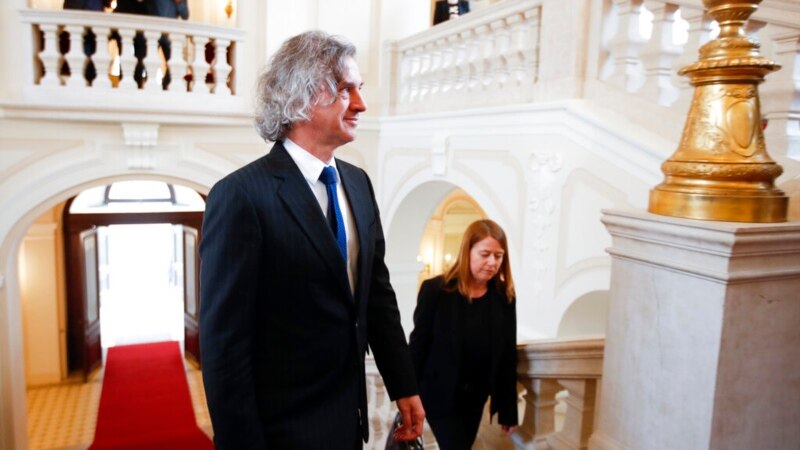
As Slovenia transitions to a new prime minister, the country’s media look for signs of a reset after the hostile rhetoric and pressure that many say they experienced under the outgoing administration.
Former power company manager Robert Golob and his center-left Freedom Movement celebrated a victory in elections last month. They are expected to formally take power in early June.
Golob indicated that one of the first tasks will be legislation to limit political pressure on journalists and protect the independence of public media.
The pledge strikes a different tone from outgoing leader Janez Jansa, whom the European Parliament criticized for hostile rhetoric and pressure directed at media. During his time in office, Jansa was handed a suspended prison sentence for verbal assaults on two female journalists. A high court upheld that ruling on May 24.
Jansa’s administration introduced changes seen by many as an attempt to disrupt press agency STA and broadcaster RTV Slovenia.
The government at the time defended its actions, saying it was addressing bias at the networks. The Government Communications Office (GCO) echoed that view, publishing criticism of RTV on its website.
Golob secured 41 out of 90 seats in parliament: more than any other party since Slovenia declared independence in 1991. His party formed a coalition with the Social Democrats and the Left. Together they hold a comfortable majority in parliament, with 53 seats.
The new administration’s pledge to protect media is welcomed by media analysts.
“I am optimistic regarding the (media) plans of the incoming government particularly since I cannot imagine that conditions at RTV Slovenia could be any worse,” said Slavko Splichal, a professor of communication at the University of Ljubljana faculty of social sciences.
Splichal, who sits on RTV’s program council, added, “I have no reason to doubt that the new government will indeed reduce political interfering in the public media.”
Period of change
As well as accusations of bias, Jansa’s Cabinet stopped paying the national news agency STA for almost a year in 2021. Funding resumed after the head of STA resigned and the new head managed to reach a deal with the government.
At RTV Slovenia, a leadership change in 2021 led to the shortening or cancellation of several popular news programs.
Many media associations and trade unions expressed support for RTV journalists.
But the Association of Journalists and Publicists in a May 23 statement said that some changes “were necessary to increase pluralism and professionalism of the RTV.”
The association, described by some groups as supporting right-leaning media, added, “The incumbent leadership of the RTV has not done anything that would limit journalistic autonomy.”
Critics, however, saw the changes at RTV as a way to curb criticism of the government.
An agreement signed by the new coalition partners on May 24 now seeks to address those changes with action to “prevent constant political meddling” at public media.
“Our priority is to protect the independence of the STA and the RTV Slovenia and enable uninterrupted running of public service,” the agreement states.
The new administration did not detail how it plans to achieve those goals.
Splichal, who sits on the RTV’s program council as a representative of the Slovenian Academy of Sciences and Arts, said any change needs to be fast to save the broadcaster.
The program council, which is legally obliged to act independently, runs RTV. Currently, parliament appoints the majority of its 29 members.
Analysts believe that one way to protect editorial independence could be to reduce the number of council members that parliament appoints.
International view
The European Parliament and rights groups have cited concerns about a decline in media freedom in Slovenia.
But, says Jamie Wiseman of the International Press Institute (IPI), there is “hope among the European media freedom community that this new government can unwind some of the more detrimental aspects of the previous government’s program regarding the media.”
The IPI will be watching for concrete actions from the incoming government.
“Vital here will be the implementation of reforms which strengthen the editorial independence of the public broadcaster RTV Slovenia,” said Wiseman, who is the IPI’s Europe advocacy officer.
Other areas that need attention, Wiseman said in an email to VOA, is “the normalization of the work of the Government Communications Office (GCO); and refraining from the attempts to attack and discredit critical journalism that was so damaging under the previous administration.”
The GCO in recent months has posted articles to its website titled Analysis of Reporting of RTV Slovenia.
The posts list content that the GCO believes shows bias against the government, including what it sees as hate speech or reports that fail to seek a government response.
Journalists and academics generally see the GCO posts as improper political commentaries.
The GCO has said previously that no one has dismissed the claims it makes, and that previous center-left governments have also tried to pressure the media.
For their part, journalists at RTV have been vocal in their protest at changes to their network and described political pressure in the past year as unbearable.
“We are here because we want to stop the aggression, we are here because we want freedom of speech,” Helena Milinkovic, head of the coordination of trade unions of journalists of RTV, said during a protest and one-hour strike on May 23.
“We fear for the existence of a public RTV,” she said, adding that the journalists demand “editorial autonomy, and the depoliticization of the public RTV.”
The broadcaster is one of the country’s most popular channels, with a monthly combined audience of about 700,000, according to station data.
But withstanding political pressure is not the only challenge for RTV, said Splichal. The academic believes that the broadcaster needs to increase its presence on the internet and social media to attract younger viewers and ensure its long-term future.
